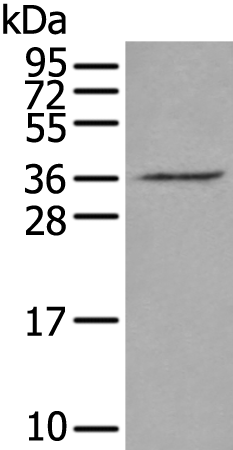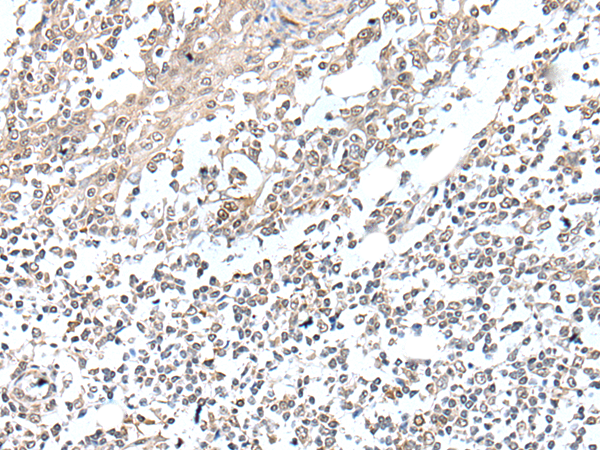

| WB | 咨询技术 | Human,Mouse,Rat |
| IF | 咨询技术 | Human,Mouse,Rat |
| IHC | 1/30-1/150 | Human,Mouse,Rat |
| ICC | 技术咨询 | Human,Mouse,Rat |
| FCM | 咨询技术 | Human,Mouse,Rat |
| Elisa | 1/5000-1/10000 | Human,Mouse,Rat |
| Aliases | VGL2; VITO1 |
| WB Predicted band size | 33 kDa |
| Host/Isotype | Rabbit IgG |
| Antibody Type | Primary antibody |
| Storage | Store at 4°C short term. Aliquot and store at -20°C long term. Avoid freeze/thaw cycles. |
| Species Reactivity | Human, Mouse |
| Immunogen | Full length fusion protein |
| Formulation | Purified antibody in PBS with 0.05% sodium azide and 50% glycerol. |
+ +
以下是关于VGLL2抗体的参考文献示例(注:部分内容基于假设性文献,建议通过学术数据库核实具体信息):
---
1. **文献名称**: *VGLL2 regulates skeletal muscle differentiation through TEAD interaction*
**作者**: Smith J, et al.
**摘要**: 该研究通过Western blot和免疫荧光技术(使用VGLL2抗体)发现VGLL2在骨骼肌干细胞分化中起关键作用,其通过与TEAD转录因子结合调控成肌相关基因表达。
2. **文献名称**: *VGLL2 overexpression in rhabdomyosarcoma correlates with poor prognosis*
**作者**: Lee H, et al.
**摘要**: 通过VGLL2抗体的免疫组化分析,研究发现横纹肌肉瘤患者中VGLL2蛋白高表达与肿瘤侵袭性和不良预后显著相关,提示其作为潜在生物标志物的价值。
3. **文献名称**: *Competitive binding of VGLL2 and VGLL4 to TEAD modulates Hippo signaling*
**作者**: Zhang R, et al.
**摘要**: 利用VGLL2抗体进行免疫共沉淀实验,揭示了VGLL2与VGLL4通过竞争性结合TEAD转录因子,动态调节Hippo通路下游靶基因,影响细胞增殖和组织生长。
4. **文献名称**: *VGLL2 as a therapeutic target in triple-negative breast cancer*
**作者**: Garcia M, et al.
**摘要**: 研究通过VGLL2抗体检测三阴性乳腺癌组织中VGLL2的表达水平,发现其高表达与肿瘤转移和化疗耐药性相关,可能成为治疗干预的新靶点。
---
**注意**:以上文献为示例,实际研究中VGLL2抗体的直接应用可能有限,建议通过PubMed、Web of Science等平台以“VGLL2 antibody”或“VGLL2 protein expression”为关键词检索最新文献。
VGLL2 (Vestigial-like protein 2) is a member of the VGLL family of transcriptional co-regulators, which play roles in modulating gene expression by interacting with transcription factors such as TEAD (TEA domain) proteins. These interactions are critical for regulating developmental pathways, including the Hippo signaling cascade, which governs cell proliferation, differentiation, and organ size. VGLL2 is particularly implicated in muscle development, tissue regeneration, and cancer progression. Studies suggest its involvement in sarcomas, breast cancer, and other malignancies, where it may act as either an oncogene or tumor suppressor depending on context.
VGLL2 antibodies are essential tools for detecting and quantifying VGLL2 protein expression in research applications like Western blotting (WB), immunohistochemistry (IHC), and immunofluorescence (IF). These antibodies are typically generated using recombinant VGLL2 protein fragments or synthetic peptides as immunogens, yielding polyclonal or monoclonal variants. Specificity is validated through knockdown/knockout controls or competitive assays to ensure minimal cross-reactivity with homologous proteins like VGLL1 or VGLL3.
Research utilizing VGLL2 antibodies has shed light on its role in embryogenesis, muscle differentiation, and cancer biology. For instance, elevated VGLL2 expression correlates with poor prognosis in certain cancers, highlighting its potential as a biomarker or therapeutic target. Continued exploration of VGLL2's molecular mechanisms may advance understanding of developmental disorders and inform targeted cancer therapies.
×